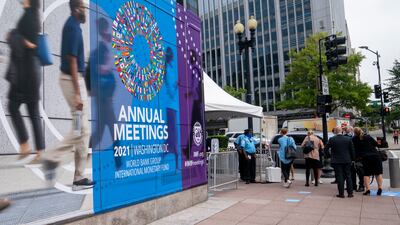The International Monetary Fund has said urgent policy action is needed to control the pandemic, limit economic scarring and transform the global economy.
In its latest global policy update, on Wednesday, the Washington-based lender said vaccination of the world population was paramount, and that policies should be calibrated to support the recovery and counter growing divergence within and between countries.
“Now is the time to come together and set things right for future generations by steering our way out of the crisis and setting course for a more prosperous future,” the fund said.
The comments came after the IMF lowered its growth forecast for the global economy this year, which is now set for a “hobbled” recovery, owing to weakening momentum as result of Covid-19 outbreaks, uneven access to vaccines, supply chain disruptions and risks from rising inflation.
The fund revised down growth in 2021 to 5.9 per cent from its 6 per cent estimate in July, while keeping its 2022 projection unchanged at 4.9 per cent.
It said the global distribution of Covid-19 vaccines is alarmingly uneven. In low-income and developing countries, less than 5 per cent of the population is fully vaccinated, compared with about 58 per cent in advanced economies, according to the IMF.
“Global co-operation to expedite universal vaccination is vital to secure the global recovery and limit health and economic divergences,” it said.
The global goal to immunise at least 40 per cent of the population in all countries by end of 2021 and 70 per cent by mid-2022 “remains a priority” and meeting these targets requires urgently ramping up supply to ensure availability of vaccines, diagnostics, and therapeutics in developing countries, it said. This means sharing doses, removing trade barriers on vaccines and related materials, and addressing financing constraints.
“The fund is collaborating closely with global partners in the fight against the pandemic,” the lender said, referring to the G7 and G20, among others.
Government policies should be calibrated to the evolving pandemic conditions and to support the recovery and counter growing inequalities, it said.
For fiscal policies, health spending remains a priority and lifelines should be increasingly targeted towards the most vulnerable groups, the fund said.
Policymakers should also seize the moment to accelerate the transformation of the global economy, including on climate change mitigation, digitalisation, inclusion and gender diversity, and the new hybrid work model, it said.

